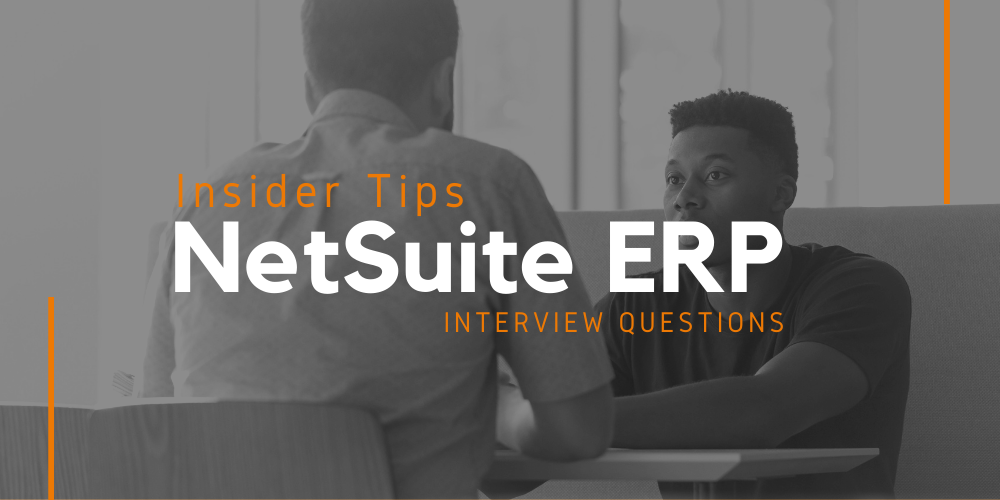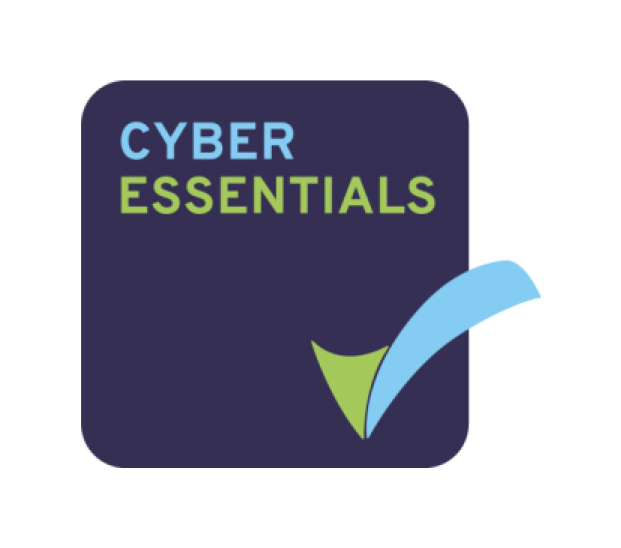
It doesn’t matter if this is your first job or you’re an experienced consultant looking for a change; interviews can be challenging. Good preparation will inevitably help, and this guide has been put together to help you nail your next ERP interview.
We’ve consulted the top recruiters and senior ERP consultants to discuss every aspect of the hiring process. Here’s what we’ll cover:
Qualities of a superstar consultant
Working as a consultant requires more than just having technical knowledge, it also involves helping to improve performance by providing relevant business solutions which solve team pain points effectively. When it comes to NetSuite jobs, interviewers are looking for candidates that understand the system, have great people skills, and know the inner workings of business processes and operations.
Qualities you should possess
- See the big picture: issues are easier to solve when you realize how the ecosystem connects with each other and understand general business processes. Before configuring or customizing a feature, really understand the purpose of it, if it’s going to actually benefit anyone and what other features it might affect.
- Enjoy solution design: any Consultant will be constantly interacting with clients and providing solutions to their problems. A good Consultant creates long-lasting relationships based on trust and empathy, becoming a trusted advisor to the client.
- Working under pressure: inevitably, you will encounter stressful situations within your role. You will need to be patient and bring them peace of mind, by saying the right things at the right time. Know how to diagnose a problem quickly, come up with an action plan and involve the client in the solution so that they see progress all the way through to the solution.
- Have exceptional business acumen: a big part of the job is to help your client find opportunities to further optimize and scale, so you must understand their business and its current situation. Find out their goals, technical processes and setup, in order to provide value-added improvements.
- Always advance your knowledge: all software products evolve, from new or removed feature sets to pricing structures. You need to stay current with the latest UI, backend, and certifications for new products.
What are the prerequisites to become a NetSuite Consultant?
Depending on the position you’re looking for, the prerequisites and certification requirements differ from role to role. Here is a summary of what is required to become a NetSuite Consultant:
Entry-level positions
If you are applying for an entry-level NetSuite Consultant role, the ideal requirements will include:
- Degree in Accounting, Computer Science, Information Systems, or related field with consistently good academic standing (CGPA 3.0 or above).
- Effective interpersonal skills with the ability to collaborate and work well with teams.
- Ability to communicate complex situations clearly and demonstrate active listening.
- Express innovative ideas, while respecting and understanding different points of views.
- Excellent oral, written, and presentation skills to get your point across effectively with key decision makers in the organization.
- Great business acumen and an attitude to learn. As the platform is constantly updating, part of your job will be to learn all the new features and changes and how they can benefit your client.
Intermediate to senior level positions
If you are applying for an experienced NetSuite Consultant role, the requirements could be:
- Degree in Accounting, Computer Science, Information Systems, or related field
- NetSuite Basic and Advanced level certifications (here’s a certifications guide for your reference).
- Three to five years of relevant NetSuite implementation experience.
- Excellent oral, written and presentation skills.
- Ability to handle C-Suite executives and key client stakeholders (CEO, CFOs, COOs, and Financial Controllers).
- Excellent understanding of bridging business and technical sides of the business, ideally with examples of when you have done this previously.
- Strong experience in financial, accounting software, professional services, SaaS, or manufacturing business processes.
- An MBA specializing in Business Design or Consulting is nice to have.
Recruiter tips
- Do your research on the role and company before speaking to them. Being able to identify relevant experience and demonstrating you are a good fit for their team culture will differentiate yourself from others.
- Remember, it is not only about skillset. Passion and commitment, as well as a flexible approach, can significantly differentiate you from other candidates interviewing.
- Don’t lie about certifications. They have their own ID that can be checked by anyone, this goes for any reputable certification such as CPA, PMP, SCRUM, etc.
Top 10 NetSuite ERP interview questions and answers
We gathered the top questions and answers from recruiters, consultants and management. This is what they said.
QUESTION 1 What does ERP stand for?
ANSWER: Enterprise Resource Management is a system created to help companies manage their business transactions and operations.
QUESTION 2 What types of Enterprise Resource Planning are out on the market? Where does NetSuite fit?
ANSWER: Typically there are two types of systems; on-premise and SaaS/Cloud. NetSuite uses cloud computing and essentially invented the concept of cloud ERP systems.
QUESTION 3 Is there a difference between SAP, JD Edwards, ERP, and NetSuite?
ANSWER: SAP, JD Edwards, and NetSuite are all ERP. The main differences are in terms of functionalities, facilities, and the audience. Some will be geared to specific industries and businesses of different sizes, so while in theory they all offer the same technology solution, they aren’t necessarily competing with each other.
QUESTION 4 What are the functional areas of Enterprise Resource Planning?
ANSWER: There are five different areas. These are:
– Financial accounting: streamline financial and accounting processes combining both functionalities into one software.
– Management accounting: a global view of business transactions, projects, and operational work.
– Human resources: takes care of the most valuable resource in the business, helping teams integrate with the system.
– Supply chain management: create custom flows to automate manual processes and detailed overviews of every step of the supply chain.
– Manufacturing: balance current supply with demand and review sales forecast to bring information enough to create an action plan.
QUESTION 5 What are the components of ERP?
ANSWER: They are:
– Transactional database: all business information is in one organized database.
– Management portal: easy to customize, allows to set up the right configurations for employees for access to enterprise-related functions.
– Human resources: create work roles, dashboards and establish KPIs to ensure your team’s best performance.
– Supply chain management: connects every operational aspect required from inventory to deliver.
– Workflow management: design, configure and edit business flows to automate processes.
– Customization report: export detail information about business performance, transactions or operational areas.
QUESTION 6 Could you explain in a nutshell why companies should buy NetSuite?
ANSWER: It depends on business requirements, but some key advantages are that it’s a cloud service, giving access to information everywhere, all the time. It’s user-friendly, and the software can even be adapted depending on your needs and preferences. You can also add or turn off modules as needed, meaning it’s a very adaptable solution.
QUESTION 7 What are some potential challenges with NetSuite?
ANSWER: This may seem like a tricky question, but as a Consultant, you need to be honest about your product without degrading its brand or functionality. A Consultant’s job is not to sell, but you must be able to convince clients that they have the best option available every time you meet them. The software can cost more than some other ERPs, and needs to be paid every year, but ultimately you get what you pay for—including a deep level of customization. The accounting rules may also be difficult to understand if you aren’t familiar with it.
QUESTION 8 What do you know about scripts? Can you name a couple of script types and provide examples.
ANSWER:
– Client scripts: light code that automates user-entered data and validates events. It helps to find data from an external source to a field.
– Workflow scripts: simple graphical interface, created to design process and custom actions.
– User event scripts: focus on user’s operational management, allows to create or edit custom records.
– Scheduled scripts: to keep track of operations, it automates operations and transaction setup, even when the software is down.
– Portlet scripts: allows custom dashboard widgets in a very simple and intuitive platform.
QUESTION 9 Does the software have different dashboard views based on roles?
ANSWER: Yes it does. According to your user account, you will be able to display different dashboard configurations depending on the role selected.
QUESTION 10 What technology is the platform built on?
ANSWER: It works on Oracle platform, combining ERP, CRM and ecommerce into one system. As it’s cloud-based, users are able to log in anywhere in the world and have access to real-time data.
Competency questions
As we have mentioned earlier, interpersonal skills are equally important to technical knowledge. This means competency-based questions are frequently used to see how candidates have handled previous situations. This is where being able to think logically will really come into its own.
There’s not necessarily a right or wrong answer, but to be prepared it’s key to think about some previous work examples you can adapt based on the questions asked. The job description and the requirements sought after will give you a good idea of likely competencies that will be asked.
A common method to help structure answers is the STAR method, which is a structured manner of responding to a competency-based interview question by discussing the specific situation, task, action, and result of the situation you are describing.
Here are some examples of questions, and things to think about with your answers.
QUESTION 1 Talk me through a project where things have not gone well. What happened and how did you respond?
ANSWER: Everyone appreciates things don’t always go to plan. The interviewer will value your honesty. However, in this question, they will be looking to see how you coped under pressure and what you have learned from this experience. They will be interested to hear how you have changed your approach to minimize the risk of this happening again. Remember to remain positive and do not criticize or blame individuals.
QUESTION 2 How have you ensured you fully understand the needs of your client?
ANSWER: This question is looking at how you understand your client, from asking lots of questions and actively listening to their answers, to challenging their requests and reviewing the impact of changes you are suggesting. It’s also about mutually agreeing on success criteria and continuously communicating with your stakeholders about what changes to expect and determining realistic timeframes.
QUESTION 3 Talk me through an example of implementing a new process to resolve an existing business problem?
ANSWER: Within this question, the interviewer will be looking at you to identify why the existing practice was not effective, how you came to your proposed solution and what approach you took to implement it. Information about how you came to your decision and the project management skills you demonstrated will also be sought after. You should talk about how your solution was implemented and what steps you took to encourage adoption. Impact, outcomes, successes, and lesson learned should also be discussed.
QUESTION 4 When was the last time you delivered a project as part of a successful team? What did you do to contribute to it?
ANSWER: Employers want team players who can work together collaboratively and harmoniously. In this answer, they want to hear how you actively work as part of a team and your role within that. Areas to consider are your communication style and judgment making ability. For example, you may need to demonstrate that you can compromise and support group decisions. Any changes you have made to improve team working and why should also be brought up in these questions as this demonstrates self-awareness and the willingness to adapt to enhance your performance.
QUESTION 5 Tell me about a complex project you have worked on and how you ensured you completed all the tasks required effectively?
ANSWER: Employers are looking for people who can effectively plan and organize projects to deliver them on time. They want to be able to assess that you can juggle multiple different projects, effectively manage your time and understand priorities and change course as needed. Explaining how you have coped in these scenarios and coming up with your rationale will give them confidence that you can.
QUESTION 6 When was the last time you delivered a project as part of a successful team? What did you do to contribute to it?
ANSWER: Employers want team players who can work together collaboratively and harmoniously. In this answer, they want to hear how you actively work as part of a team and what role you specifically contributed to make the team successful. Areas to consider are your communication style with the team and judgement making ability. For example, you may need to demonstrate that you can compromise and support group decisions. Any changes you have made to improve team working and why should also be brought up here.
Advice once you’re hired
Cut off distractions during training
It may sound obvious, but you will be surprised. Whenever we are multitasking, our brain is on autopilot. This is great for physical tasks, but not for learning. If you are easily distracted, avoid using music in general and turn off devices such as mobile phones.
One idea is to set an alarm and study for short—but intense—periods of time. This is a more strategic approach and will also give you the opportunity to reply to your texts soon enough. If you get stuck on a module, leave it and continue with the next one. Go back and face the harder ones when you are refreshed.
Here’s an updated list of online paid and free training and courses.
Feel free to pause when feeling frustrated
Even though the platform is pretty friendly, that doesn’t mean that some modules or features won’t be hard to understand. Remember that the ERP software is huge and it has been designed to be used by specialized teams, different from a Consultant who needs to have a more general understanding of it.
Play as much as possible in the demo account
Use the demo account to make mistakes rather than getting stressed about it. The demo account was created for users to experiment and discover. Once you finish your training, keep using it to try new things. When it comes to module updates, your demo account will prevent you from making mistakes on a client account.
Never stop learning
Major updates are typically launched twice a year, which means you need to constantly update your knowledge. Once you finish your last certification, there will likely be some news about the next system update. Find specialized sources beyond official sites, and try to share with colleagues by assisting with official events or masterclasses.
Advice from recruiters and Consultants:
- If you have the experience, get the certification: remember that each certification must be renewed every year with a brief test. Certifications may be expensive but will validate your knowledge of the system.
- Brand yourself: participate as much as possible, go to events, meetups/chapters, and courses. Every industry activity is a possibility to promote yourself, generate connections and get to know people as well as discover the latest industry trends.
- Create a portfolio: if you have some experience (even if it was just an internship), start creating your own portfolio and bring enough detail to create a case study. Recruiters will love it for two reasons:
a. It’s the most professional way to show your experience. It will help your resume to stand out from the rest.
b. They will notice that you have experience managing clients and that you are passionate about what you are doing. - Be aware of your professional value: Recruiters’ first problem is receiving too many candidates that don’t fit the position. If you are overqualified, focus on talking about why you would like to work in that company. If you are a little under-qualified, focus on promoting the idea that you will learn and gain experience. If you are totally under qualified, don’t apply; you will just lose time and get frustrated because of false hopes. Focus instead on gaining more knowledge through various NetSuite resources and gain experience.
So what next?
There are all kinds of ERP jobs on the market, the key is to find the right one where you can develop your skills, improve your knowledge and generate new business relationships. The key advice for any Consultant is to find an agency that actually invests in their talent and is constantly in pursuit of better. Good luck!
Useful links to help you prep:
There’s plenty of awesome preparation material that go beyond this post to help you ace that interview and advance your career. Check the links below for further reading on everything from training and certification, to networking opportunities.
- Certification guide
- Training courses
- NetSuite resources from Trajectory inc
- 7 exciting events for your 2019 calendar
- NetSuite products and services (detail explanation)
- NetSuite plugins and extensions
Luivir Rangel is a Digital Content Curator at Trajectory, Inc, responsible for client engagement and staff playtime at the office. Better known as “the girl with questions”, her favorite source of information is her audience; always testing campaigns, improving SEO, interviewing Trajectory’s in-house team and connecting clients with top NetSuite consultants.



